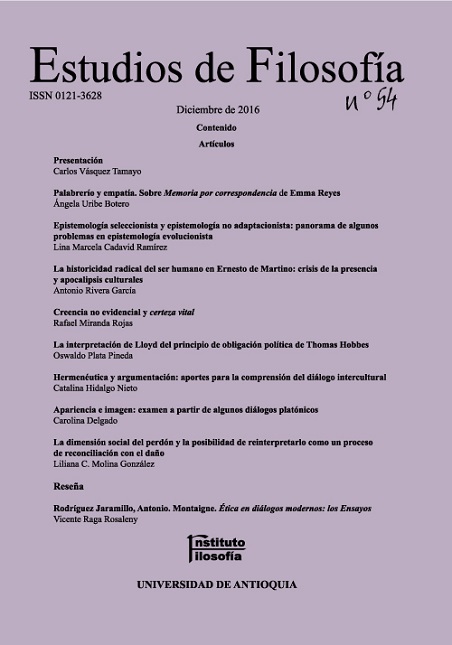Hermeneutics and Argumentation: Contributions for the Understanding of Intercultural Dialogue
DOI:
https://doi.org/10.17533/udea.ef.n54a07Keywords:
Intercultural dialogue, heterogenic rationalities, argumentative dimension, hermeneutic dimension, understandingAbstract
In today's pluralistic societies, the meeting of heterogeneous rationalities has led to the emergence of intercultural conflicts, whose solution is usually expected from intercultural dialogue spaces. In these spaces, dialogue's argumentative dimension is fundamental, for the parts in conflict have the leading role in a reason exchange with a communicative aim. Nevertheless, since it's an intercultural dialogue, the argumentative dimension is insufficient for it does not offer the necessary lineaments to understand arguments justified by a rationality different from its own. As a result, intercultural dialogue needs a hermeneutic dimension, which should exhibit how the dialogical encounter of heterogeneous rationalities helps to expand the comprehension processes of the parties, and so, establishing the dialogical base required for the construction of a pluralist society.
Downloads
References
Berger, P. (1999). “The Desecularization of the world; s Global Overview”, en: Peter L. Berger (Ed.), The Desecularization of the World. Resurgent Religion and World Politics. Washington D.C.: Ethics and Public Policy Center. 1-18.
Estermann, J. (2006). “La racionalidad Andina”, en: Filosofía Andina: Sabiduría indígena para un mundo nuevo. La Paz: ISEAT.
Fornet-Betancourt, R. (1994). “Pensamiento iberoamericano: ¿base para un modelo de filosofía intercultural?”, en: Hacia una filosofía intercultural latinoamericana. San José, Costa Rica: Editorial DEI, 27-63.
Fornet-Betancourt, R. (2004). “Interculturalidad y crítica de la filosofía latinoamericana más reciente” y “El giro hacia la interculturalización de la filosofía en otros autores”, en: Crítica intercultural de la filosofía latioamericana actual. Madrid: Editorial Trotta, pp. 19-74, 75-106.
Fornet-Betancourt, R. (2000). “Supuestos filosóficos del diálogo intercultural”. Publicado por: Polylog, Foro para filosofía intercultural. [En línea] Recuperado el 9 de enero de 2016 en: http://them.polylog.org/1/ffr-es.htm
Habermas, J. (2010). Teoría de la acción comunicativa, vol. 1. Madrid: Taurus ediciones.
Habermas, J. (2006). Entre naturalismo y religión. Barcelona: Paidós Básica.
Habermas, J. (1991). La inclusión del otro. Barcelona: Ediciones Paidós Ibérica.
Habermas, J. (1983). Conciencia moral y Acción comunicativa. Barcelona: Ediciones Península.
Hacking, I. (2002). “Style for historians and philosophers”, en: Historical Ontology, Cambridge, Massachusetts, London, England, Harvard University Press.
Gadamer, H. G. (1998, [1959]). Verdad y método II. Salamanca: Ediciones Sígueme.
Gómez, C. M. (2014). “La condiciones postseculares de la creencia religiosa”, en: Carlos Miguel Gómez (ed.), La religión en la sociedad post-secular, Bogotá: Editorial Universidad del Rosario.
Gómez, C. M. (2012). Interculturality, Rationality and Dialogue: In Search for Intercultural Argumentative Criteria for Latin America. Alemania: Echter Verlag.
Grondin, J. (2002). “Gadamer’s basic understanding of understanding”, en: Dostal, Robert J. (ed.) The Cambridge Companion to Gadamer. Estados Unidos de América: The Cambridge University Press. 36-51.
Macintyre A. (1994). Justicia y racionalidad. Madrid: Ediciones Internacionales Universitarias.
Malcolm, N. (1992). “La carencia de fundamentación de la creencia”, en: Enrique Romerales, (Ed.), Creencia y racionalidad. Lecturas de filosofía de la religión, Barcelona: Anthropos.
Mardones, J. M. (2005). “Nuevas religiosidades o religiosidades difusas” y “Religiosidad fuerte. El fundamentalismo”, en: La transformación de la religión. Madrid: Editorial PPC. 74-84, 85-106.
Schmidt, T. (2014). “Hacia un pluralismo razonable: la secularización y el futuro de la religión”, en: Carlos Miguel Gómez (Ed.), La religión en la sociedad post-secular. Bogotá: Editorial Universidad del Rosario. 113-131.
Toulmin, S. (2007). Los usos de la argumentación. Barcelona: Ediciones Península.
Panikkar, R. (2000). “Religión, filosofía y cultura”. Publicado por: Polylog, Foro para filosofía intercultural. [En línea] Recuperado el 9 de enero de 2016 en: http://them.polylog.org/1/fpr-es.htm
Panikkar, R. (1999). The intrareligious Dialogue. New York: Paulist Press.
Published
How to Cite
License
Copyright (c) 2016 Catalina Hidalgo Nieto

This work is licensed under a Creative Commons Attribution-NonCommercial-ShareAlike 4.0 International License.
Authors who publish with this journal agree to the following terms:
1. The Author retains copyright in the Work, where the term "Work" shall include all digital objects that may result in subsequent electronic publication or distribution.
2. Upon acceptance of the Work, the author shall grant to the Publisher the right of first publication of the Work.
3. The Author shall grant to the Publisher a nonexclusive perpetual right and license to publish, archive, and make accessible the Work in whole or in part in all forms of media now or hereafter known under a Creative Commons Attribution-NoCommercia-ShareAlike (CC BY-NC-SA 4.0), or its equivalent, which, for the avoidance of doubt, allows others to copy, distribute, and transmit the Work under the following conditions: (a) Attribution: Other users must attribute the Work in the manner specified by the author as indicated on the journal Web site;(b) Noncommercial: Other users (including Publisher) may not use this Work for commercial purposes;
4. The Author is able to enter into separate, additional contractual arrangements for the nonexclusive distribution of the journal's published version of the Work (e.g., post it to an institutional repository or publish it in a book), as long as there is provided in the document an acknowledgement of its initial publication in this journal;
5. Authors are permitted, and Estudios de Filosofía promotes, to post online the preprint manuscript of the Work in institutional repositories or on their Websites prior to and during the submission process, as it can lead to productive exchanges, as well as earlier and greater citation of published work (see The Effect of Open Access). Any such posting made before acceptance and publication of the Work is expected be updated upon publication to include a reference to the Estudios de Filosofía's assigned URL to the Article and its final published version in Estudios de Filosofía.















